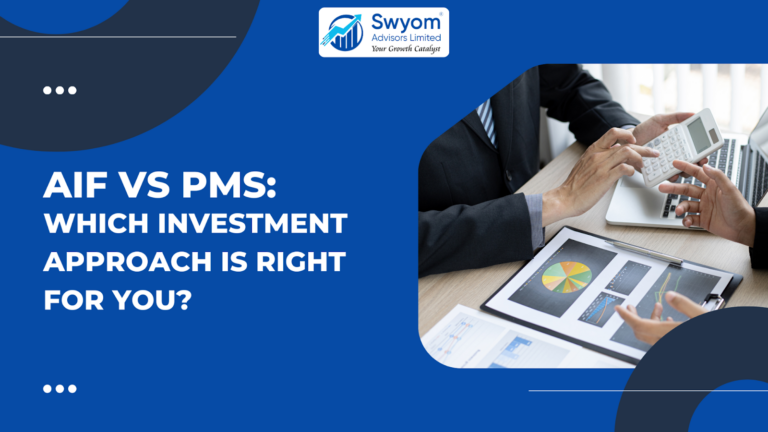When it comes to wealth management and high-net-worth investing, Alternative Investment Funds (AIF) and Portfolio Management Services (PMS) are two of the most popular options. Both offer customized strategies beyond traditional mutual funds and stocks, but they cater to different investment objectives and risk appetites. Understanding their key differences can help investors make informed decisions that align with their financial goals.
Understanding Alternative Investment Funds (AIF)
AIFs are privately pooled investment funds that invest in a variety of asset classes, including private equity, hedge funds, real estate, and venture capital. They are typically classified into three categories:
- Category I AIFs: Focus on investing in start-ups, infrastructure, and small-medium enterprises (SMEs). These funds contribute to economic growth and often receive government incentives.
- Category II AIFs: Include private equity funds, debt funds, and funds that do not fall under Category I or III. These are often preferred by investors seeking long-term capital appreciation.
- Category III AIFs: Primarily hedge funds and other high-risk strategies that aim to generate short-term gains through complex trading techniques.
Who Should Invest in AIFs?
- Ultra-high-net-worth individuals (UHNWIs) looking for diversification beyond conventional assets.
- Investors with a high-risk appetite willing to explore private markets.
- Those who prefer structured and alternative strategies with professional fund management.
Understanding Portfolio Management Services (PMS)
PMS is a tailored investment service where a portfolio manager actively manages individual client portfolios. Unlike AIFs, where funds are pooled, PMS offers personalized investments in equity, fixed income, and other instruments based on the client’s financial profile and risk tolerance.
Types of PMS
- Discretionary PMS: The portfolio manager has full control over investment decisions based on the agreed-upon strategy.
- Non-Discretionary PMS: The investor makes the final call on investments, with advice from the portfolio manager.
- Advisory PMS: The manager provides investment recommendations, but execution remains the investor’s responsibility.
Who Should Invest in PMS?
PMS is ideal for:
- High-net-worth individuals (HNIs) who want customized investment strategies.
- Investors who prefer direct equity exposure with active portfolio management.
- Those who seek flexibility in asset allocation without pooling funds with others.
| Feature | AIF | PMS |
| Structure | Pooled investment fund | Individually managed portfolio |
| Minimum Investment | ₹1 crore (as per SEBI regulations) | ₹50 lakh (for discretionary PMS) |
| Regulatory Body | SEBI (Alternative Investment Funds Regulations, 2012) | SEBI (Portfolio Managers Regulations, 1993) |
| Customization | Standardized strategies for all investors | Highly customized per investor |
| Liquidity | Lower liquidity due to lock-in periods | Higher liquidity; investor can withdraw funds |
| Risk & Returns | Higher risk with potential for higher returns | Managed risk based on investor’s profile |
| Investment Flexibility | Restricted to predefined asset classes | Flexible across equities, debt, and derivatives |
Key Differences Between AIF and PMSWhich One Should You Choose?
- Choose AIF if: You are a sophisticated investor looking for exposure to alternative investments like private equity, hedge funds, or structured products with a high-risk appetite.
- Choose PMS if: You prefer direct equity exposure with personalized strategies and active management but still want control over liquidity and investment decisions.
Final Thoughts
Both AIF and PMS offer unique advantages depending on an investor’s financial objectives, risk tolerance, and investment horizon. If you seek diversification and alternative strategies, AIFs may be the right choice. On the other hand, if you prefer a personalized, actively managed portfolio, PMS could be a better fit.
Understanding these differences will help you make an informed decision and align your investments with your long-term financial goals. Need help choosing the right investment approach? Consult with our experts at SWYOM for tailored investment solutions.
📈 Make the right investment choice today!

